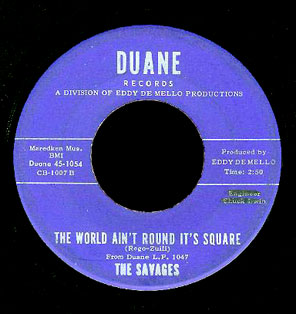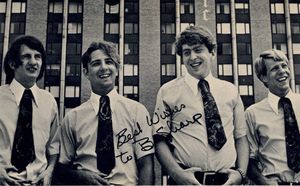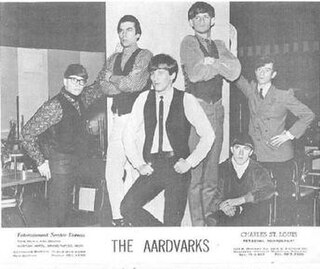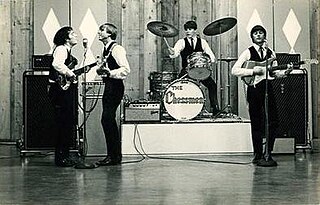Related Research Articles
Garage rock is a raw and energetic style of rock music that flourished in the mid-1960s, most notably in the United States and Canada, and has experienced a series of subsequent revivals. The style is characterized by basic chord structures played on electric guitars and other instruments, sometimes distorted through a fuzzbox, as well as often unsophisticated and occasionally aggressive lyrics and delivery. Its name derives from the perception that groups were often made up of young amateurs who rehearsed in the family garage, although many were professional.

Evil was a garage rock band from Miami, Florida, active between late 1965 and early 1967. They were known for a hard–driving, sometimes, thrashing 60s punk sound that combined elements of blues, rockabilly, and British invasion influences. They recorded several songs, amongst which “Always Runnin' Around” and “Whatcha Gonna Do” were released as a single on Living Legend Records in 1966. The band would eventually be signed to Capitol Records, but broke up shortly thereafter. In more recent years they have become particularly noted for several previously unreleased songs recorded in 1966, which have been released in recent years on various independent labels from acetates, such as "From a Curbstone," "Short Life," and especially "I'm Movin' On," which is now regarded as a garage classic.
The Shames were a garage rock band from Ipswich, Massachusetts who were active in the mid-1960s. They are known amongst collectors for two songs which are highly regarded: "Special Ones" and especially "My World is Upside Down," which has been mentioned as a classic in the genre.

The Gentlemen were an American garage rock band from Dallas, Texas, who were active from 1964 to 1968. They are best known for their 1966 song, "It's a Cry'n Shame", which has been recognized as one of the greatest songs in garage rock. The band is noted for the contributions of guitarist and songwriter, Seab Meador. Jimmie Vaughan, later a member the Fabulous Thunderbirds and brother of Double Trouble guitarist Stevie Ray Vaughan, served a brief stint for several months in the Gentlemen in late 1965 and early 1966, but did not appear on any of their recordings. He went on to play in another Dallas garage rock band, the Chessmen.

Bohemian Vendetta was an American garage rock and psychedelic band from Long Island, New York, who were active from 1966 to 1968. In addition to recording two officially released singles and several previously unissued demos, they cut a self-titled album, Bohemian Vendetta, released by Mainstream Records in 1968.

"The World Ain't Round It's Square" is a song recorded in 1966 by The Savages, a garage rock band from Bermuda and was written by Howie Rego and Bobby Zuill. It was recorded live at the Hub, a nightclub at the Princess Hotel in Bermuda and appeared on their live album taped from the event, Live 'n Wild. The song has been mentioned as a landmark anthem of 1960s youthful defiance and is ranked #4 in the list of the 1000 greatest garage rock records in Mike Markesich's Teenbeat Mayhem. It has been featured on the Teenage Shutdown! The World Ain't Round, It's Square! compilation as well as included the reissue of Live 'n Wild.

The Liberty Bell was an American garage rock/psychedelic rock band from Corpus Christi, Texas who were active in the 1960s. They specialized in a blues-based brand of proto-punk influenced by British groups such as the Yardbirds. The band failed to reach wider audience in the time, but have come to the attention of garage rock collectors and enthusiasts in the intervening years since their breakup, with their work appearing on several compilations.

Back from the Grave, Volume 9, released on LP and CD in 2015, is the ninth installment in the Back from the Grave series of garage rock compilations. Like all the entries in the series it was assembled by Tim Warren of Crypt Records. As indicated in the subheading which reads "Raw Blastin' Mid 60s Punk," this collection consists of many songs which display the rawer and more aggressive side of the genre and are often characterized by the use of fuzztone-distorted guitars and rough vocals. In typical fashion, the set generally excludes psychedelic, folk rock, and pop-influenced material in favor of basic primitive rock and roll.
The Shy Guys were an American garage rock band from Oak Park, Michigan who were active in the 1960s. They are known for songs such as "We Gotta Go," which became a hit in Detroit and the southern Michigan area, and also in the Buffalo, New York region.
The Penthouse 5 were an American garage rock band from Oak Cliff, Texas, a suburb of Dallas and were active from 1964-1967. The band's style was highly influenced by popular British acts like the Beatles and the Kinks, as well as the folk rock of the Byrds. In 1967 they shortened their name to the Penthouse and also began to play occasional gigs with a horn section as a soul outfit under the name of Dr. William’s Soul Emporium.

T.C. Atlantic was an American garage rock/psychedelic rock band from Minneapolis, Minnesota who were active in the 1960s. They were one of the most popular groups in the Twin Cities, but failed to break nationally. In the intervening years since their breakup, their recordings have attracted the interest of '60s music collectors and enthusiasts, and they are particularly remembered for their 1966 fuzz-tinged song, "Faces", which has been mentioned as one of the earliest garage rock songs to display psychedelic characteristics.

The Montells were an American garage rock band from Miami, Florida who were active in the 1960s. They briefly operated under the name H.M. Subjects and recorded a version of the Pretty Things's "Don't Bring Me Down," which while in the process of becoming a local hit, became embroiled in a controversy involving Morton Downey, Jr., then a disc jockey at Miami's WFUN and later of talk show fame. The song was criticized for its apparently sexually suggestive lyric and the contention that Downey allegedly took payola for the song, an allegation which was never proven. The band went on to record another single, once again as the Montells, featuring an A-side for which they are remembered, "You Can't Make Me." They broke up in 1967, but reunited for a performance in 2008.

Sir Winston and the Commons were an American garage rock band formed in Indianapolis, Indiana, in 1963. The group released two highly regarded singles, which, upon release, earned the band a regional following, and resulted in reinterest in their music over the years. At the height of their popularity, Sir Winston and the Commons were regulars at the teen dance club the Cellar, in Chicago.

"Time Won't Let Me" is a garage rock song that was recorded by the Outsiders in September 1965. The song became a major hit in the United States in 1966, reaching No.5 on the Billboard Hot 100 on the week of April 16 of that year. It is ranked as the 42nd biggest American hit of 1966. In Canada, the song also reached No.5 in the weekly charts.

The Plagues were an American garage rock band from Lansing, Michigan who were active in the 1960s. They were led by bass player, principal songwriter, and vocalist William Malone. The group had a local and regional hit with "I’ve Been Through It Before". Malone left the band in 1966 to join the Frightened Trees, as the remaining members formed a new group out of the ashes of the Plagues, the Plain Brown Wrapper. Malone later became a successful Hollywood movie director, whose 2008 horror thriller Parasomnia included "I’ve Been Through It Before", as well as other songs by the Plagues and other 1960s garage bands. In the intervening years the Plagues work has attracted a following amongst garage rock enthusiasts and collectors.

The Aardvarks were an American garage rock band from Muskegon, Michigan who were active between 1964-1968. They recorded three singles, two of which were issued on labels of Dave Kalmback's Fenton Records based in Sparta, Michigan. The group scored a local hit with "I'm Higher than I'm Down", which is now considered a garage rock classic, and several of their songs have been included in garage rock compilations.

The Dagenites were an American garage rock a band from Oxon Hill, Maryland near Washington, DC, who were active in the 1960s. They shared management and frequent billing with noted guitarist and performer Link Wray. In recent years their work has become highly regarded amongst garage rock enthusiasts and collectors and has been included on several compilations. The Dagenites are especially known for their proto-punk anthems, "I Don't Want to Try it Again" and "I'm Gone Slide", both of which have been mentioned as garage rock classics.

The Kings Ransom were an American garage rock band from Allentown, Pennsylvania who were active from 1965 to 1968 and were a popular act in the Lehigh Valley area, as well as around Philadelphia. Their record "Shame" became a hit in Milton, Pennsylvania and received airplay in Michigan. In the intervening years the Kings Ransom's music has come to the attention of garage rock enthusiasts with the release of several of their songs on compilations such as Allentown Anglophile and Teenage Shutdown! Teen Jangler Blowout!

The Chessmen were an American garage rock band from Denton, Texas, near Dallas, who were active in the 1960s. They were one of the most popular bands in the region and recorded for Bismark Records, where they recorded three singles including, "I Need You There", which is now considered a garage rock classic. The band is notable for including several members who went on to greater fame. Jimmie Vaughan, brother of Stevie Ray Vaughan was briefly a member, joining after the death of original band leader, guitarist, and vocalist, Robert Patton, who died in a boating accident in 1966. Drummer Doyle Bramhall later played with and wrote songs for Stevie Ray Vaughan, and Bill Etheridge later played bass with ZZ Top. Following the breakup of the Chessmen, several of their members, including Jimmie Vaughan, went on to form a group that would come to be known as Texas Storm, which eventually included Stevie Ray Vaughan on bass.
The Tamrons were an American garage rock band from Concord, North Carolina, near Charlotte who were active in the 1960s. They became one of the most popular bands in Concord and the Charlotte area during the mid-1960s and enjoyed a regional hit with their single, "Wild-Man" backed with "Stop, Look, Listen" recorded at Arthur Smith's studio in Charlotte and released on his Pyramid label. They broke up in 1968. In the intervening years their work has become highly regarded by garage rock enthusiasts and has appeared on several compilations.
References
- 1 2 3 4 5 6 7 8 9 10 11 12 13 14 15 16 17 18 19 20 21 Justice, Tim. "Gentlemen". 60s Garage Bands.com. Retrieved August 12, 2015.
- 1 2 3 4 5 gilesi, n/a (August 30, 2013). "Classic Singles #56: The Gentlemen – It's a Cry'n Shame / You Can't Be True (1966)". Cosmic Mind at Play. Word Press.com. Retrieved August 14, 2015.
- 1 2 3 4 5 6 7 8 9 10 11 12 13 14 15 16 17 18 19 20 Bishop, Chris (January 7, 2008). "The Gentlemen". Garage Hangover. Retrieved August 12, 2015.
- 1 2 Markesich, Mike (2012). Teen Beat Mayhem (First ed.). Branford, Connecticut: Priceless Info Press. p. 118. ISBN 978-0-9856482-5-1. - According to Markesich, the recordings for "Beg, Borrow of Steal" and "Here I Cannot Stay" were done by Boyd Rec. Studio. But, more specifically, based on other references and quotes by drummer Tim Justice, the acetates were recorded at Sumet Studio, which was located downstairs in the same building, and then mastered upstairs by Boyd Recording Services. In addition, Justice indicates (see Bishop) that the later songs, "It's a Cry'n' Shame" and "You Can’t Be True," were also recorded at Sumet and mastered at Boyd, then released on Vandan.
- 1 2 Bishop, Chris (January 7, 2008). "The Gentlemen". Garage Hangover. Retrieved August 12, 2015. – According to drummer Tim Justice: "Jimmie reminds me that these AND the later ‘It’s a Cry’n Shame’ sessions were recorded at Sumet Studio, and the master acetates were made upstairs at Boyd Recording Service. [This first session] cost $150 that we split 4 ways. We just wanted to see what we sounded like and never tried to find a label."
- ↑ gilesi, n/a (August 30, 2013). "Classic Singles #56: The Gentlemen – It's a Cry'n Shame / You Can't Be True (1966)". Cosmic Mind at Play. Word Press.com. Retrieved August 14, 2015. – According to drummer Tim Justice: "The Gentlemen didn’t release any more singles, though an acetate does exist of earlier recordings from 1965, ‘Beg, Borrow Or Steal’ and ‘Here I Cannot Stay’."
- 1 2 3 Warren, Tim. Back From the Grave Vol. 9 and 10 (CD). Crypt Records serial number 114, rel. 2015 – The demo acetate appears on the Back From the Grave Vol. 9 LP and Vol. 9 and 10 CD, which combines both albums onto one CD.
- ↑ Patterson, Rob (May 10, 1979). "Werewolves' elegant waste". 813 College Street Bowling Green, KY: Bowling Green Daily News (bgdailynews.com). Daily News (Bowling Green Kentucky). p. 10-B. Retrieved August 16, 2015.
{{cite news}}: CS1 maint: location (link) - ↑ Pebbles Volume 5 (CD). AIP Records CD 5022, rel. 1992 – In liner notes (probably written by Greg Shaw), it mentions that the Werewolves were signed to a major label.
- ↑ "The 1980s". The Dead Rock Stars Club. Doc-Rock@TheDeadRockStarsClub.com. Retrieved August 16, 2015.
- ↑ Markesich, Mike (2012). Teen Beat Mayhem (First ed.). Branford, Connecticut: Priceless Info Press. p. 118, 387. ISBN 978-0-9856482-5-1.